Key takeaways:
- Pro-life advocacy emphasizes the inherent value of all human life, advocating for supportive environments that reduce the need for abortion.
- Effective facilitation in workshops fosters open dialogue, inclusivity, and emotional engagement among participants, enhancing understanding of pro-life issues.
- Utilizing interactive activities and feedback mechanisms enhances participant engagement and can lead to more meaningful discussions and connections.
- Challenges in facilitation include managing differing emotional investments and addressing sensitive topics while ensuring a safe space for all voices.
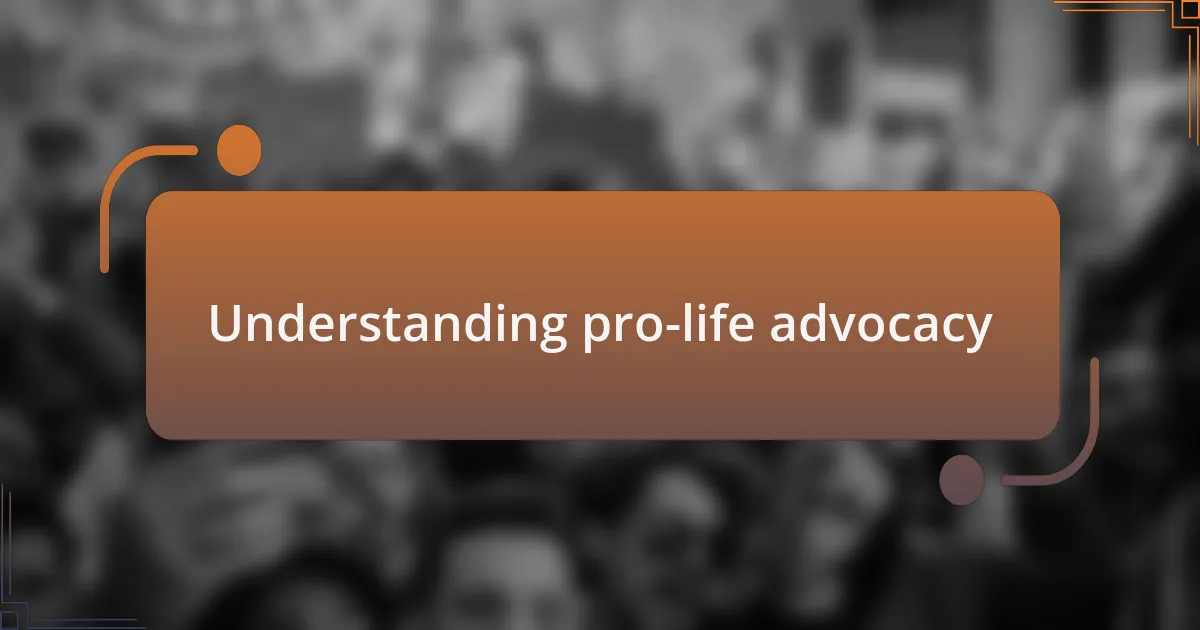
Understanding pro-life advocacy
Pro-life advocacy revolves around the belief in the inherent value of all human life, from conception until natural death. I remember attending a workshop where a heartfelt story was shared about a woman who chose life against daunting odds. This powerful narrative reminded everyone in the room of the profound impact individual choices can have on society and ignited a passionate discussion about the importance of supporting both women and babies.
Many supporters feel a deep moral obligation to advocate for the unborn. I often find myself pondering how we can create an environment that reduces the need for abortion by offering real alternatives. From my experiences in various workshops, fostering genuine conversations about these alternatives truly empowers individuals and emphasizes that every life is a journey worth supporting.
Engaging with different perspectives in pro-life advocacy also expands my understanding of the complexities involved. During a recent discussion, a participant posed the question, “How can we effectively communicate our beliefs without alienating those who disagree?” This challenge fuels my passion to navigate such conversations, recognizing that empathy and understanding are vital in bridging divides and fostering constructive dialogues.
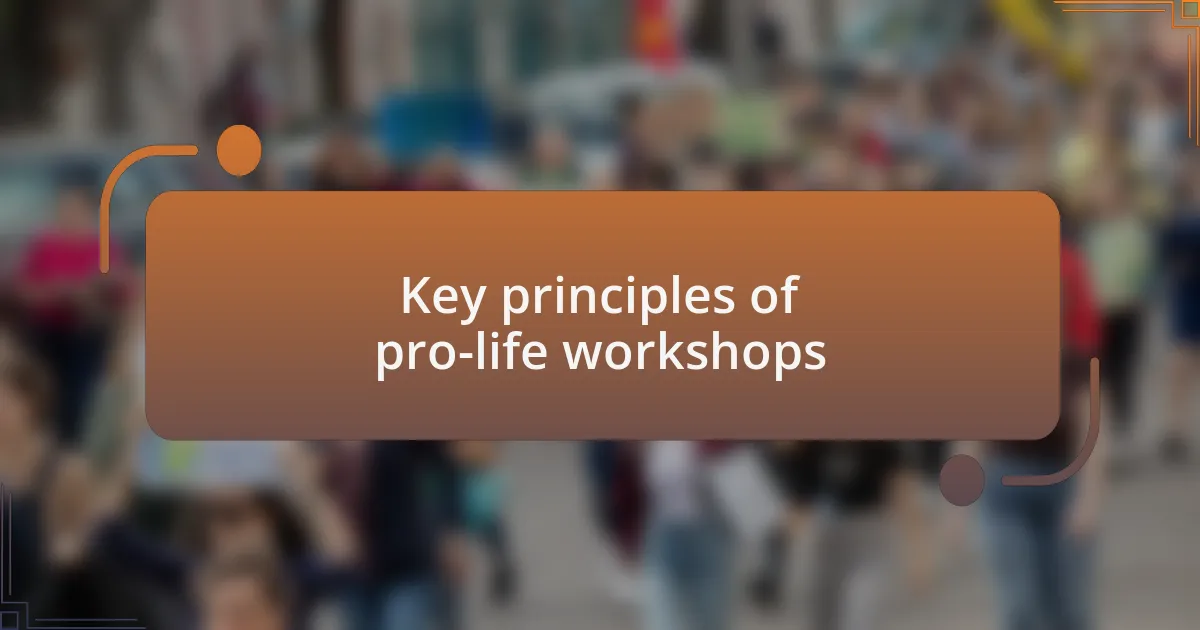
Key principles of pro-life workshops
One key principle of pro-life workshops is the emphasis on education. I recall a session where we reviewed factual data regarding fetal development, presenting it in a way that was accessible yet profound. This approach not only informed attendees but also sparked a deeper emotional connection to the cause, demonstrating how knowledge can transform perspectives.
Another essential aspect is fostering a safe space for dialogue. In one workshop, we broke into small groups to share personal stories and challenges related to pro-life advocacy. I was moved by how openness nurtured trust among participants, allowing for honest exchanges that enriched our understanding of one another. This atmosphere encourages individuals to voice their feelings without fear of judgment, which is crucial for genuine engagement.
Finally, it’s vital to highlight community support in pro-life initiatives. I vividly remember a powerful moment when a participant shared how local outreach programs had changed her life and inspired her advocacy. Real-life examples like this remind us that collective efforts can create significant impacts, reinforcing the idea that together, we can provide both hope and practical assistance to those facing difficult choices.
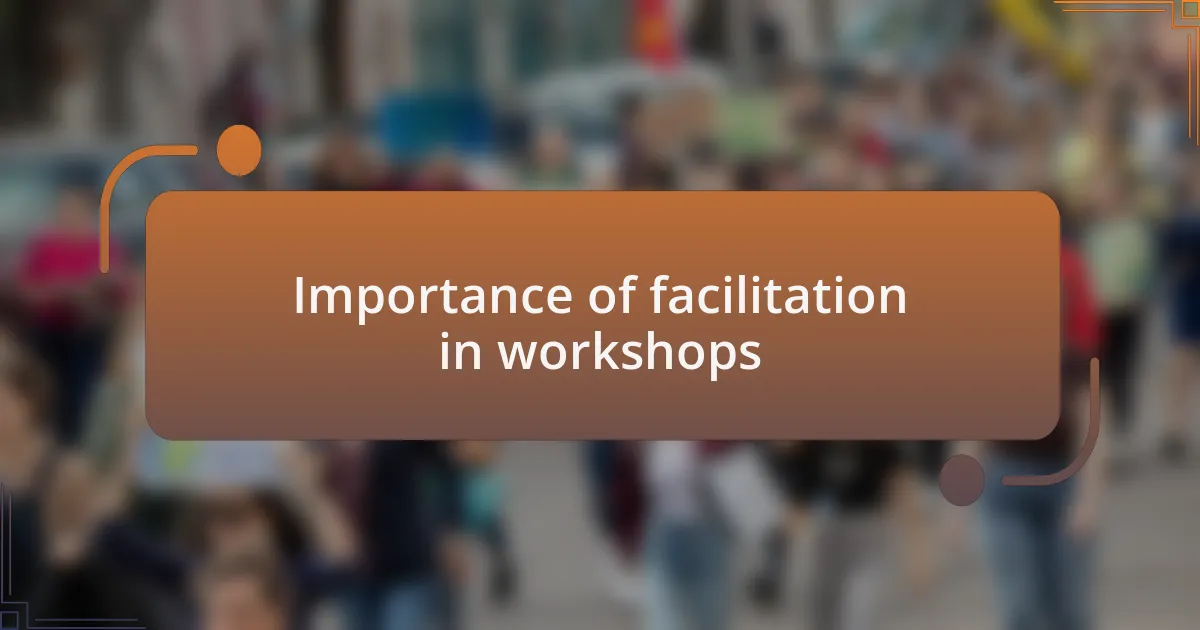
Importance of facilitation in workshops
Facilitation plays a crucial role in guiding discussions during workshops. I remember a moment when I noticed a participant hesitating to share her thoughts on a particular topic. By gently encouraging her and framing the question, I witnessed how her willingness to participate blossomed, highlighting the facilitator’s role in nurturing confidence and inclusivity. Isn’t it fascinating how the right prompts can unlock a wealth of insight?
Moreover, effective facilitation ensures that all voices are heard, fostering a more comprehensive understanding of the pro-life perspective. During one workshop, I employed a method where participants could anonymously submit questions. The diversity of inquiries was eye-opening, revealing the myriad of concerns people have about pro-life issues, and showing me that sometimes, people have more to say than they believe. This approach not only informs our discussions but also builds connections among participants.
Facilitators also keep the focus on the workshop’s objectives, ensuring that discussions remain productive. In a past session, I noticed discussions veering off course, so I stepped in to refocus the group. That decision transformed the energy in the room, allowing us to delve deeper into our key topics without losing momentum. Can you see how a facilitator acts as a compass, guiding the group back to the heart of the matter?
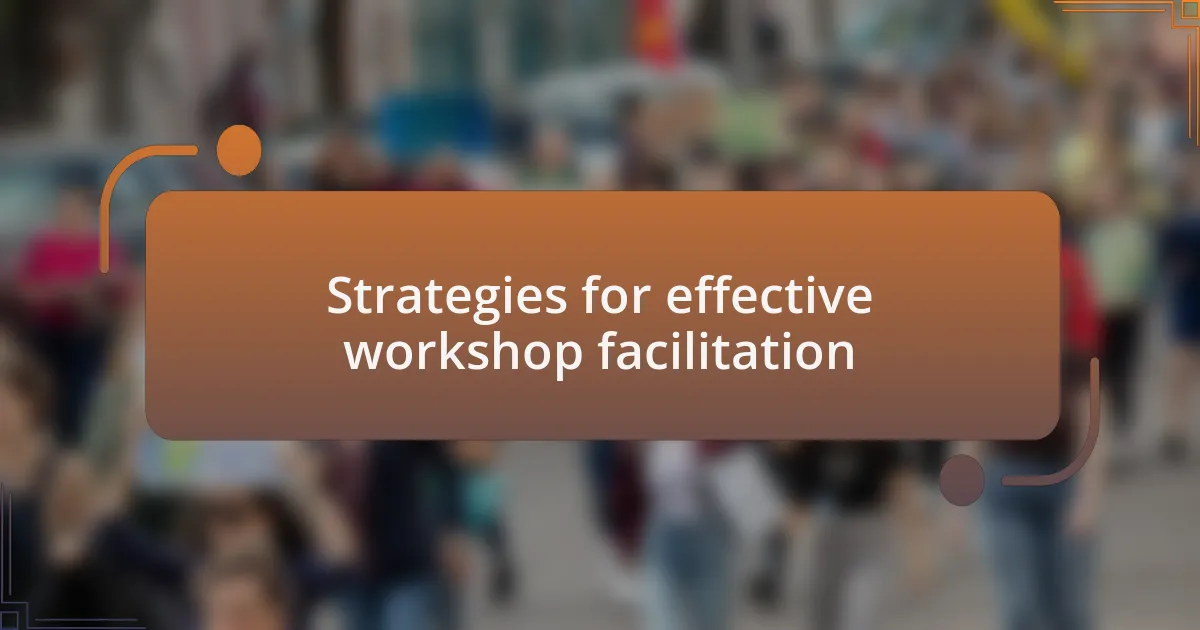
Strategies for effective workshop facilitation
To effectively facilitate a workshop, one must prioritize creating a welcoming environment. I recall a workshop where I intentionally arranged the seating in a circle. This small shift made participants feel more connected and less intimidated. Have you ever noticed how the layout can change the dynamic of a discussion? It truly fosters openness and encourages individuals to share their thoughts more freely.
Another key strategy involves actively listening and validating participants’ contributions. I remember a workshop where a participant expressed a controversial opinion, and instead of dismissing it, I validated their feelings and invited further dialogue. The atmosphere shifted dramatically, and others began to share their perspectives without fear of judgment. Isn’t it empowering when people see that their voices are valued?
Lastly, using interactive activities can significantly enhance engagement and retention of information. During one session, I incorporated small group discussions, allowing participants to brainstorm solutions to pro-life challenges. The energy in the room was palpable, and the creative ideas that emerged astounded me. How much more impactful do you think learning becomes when it’s not just about listening but actively participating? By encouraging this, I’ve seen participants leave feeling inspired and equipped with new knowledge and strategies.
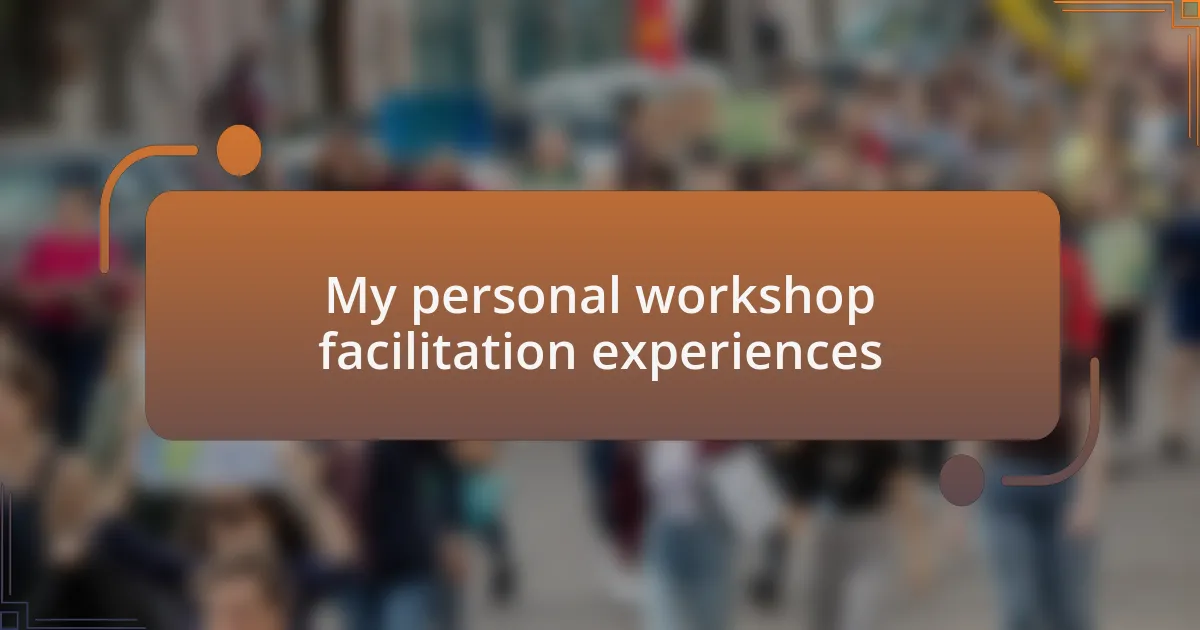
My personal workshop facilitation experiences
Facilitating workshops has been a journey of growth for me, filled with moments that truly shaped my approach. At one workshop, I decided to start with a personal story about my own experiences in pro-life advocacy. As I shared my journey, I could feel the room shift from a hesitant atmosphere to one of camaraderie. Have you ever seen how a shared vulnerability can forge connections? It was incredible to witness participants becoming more open, inspired to share their own stories.
One experience that stands out involved a challenging topic around maternal health. I incorporated a role-playing exercise where participants had to defend their viewpoints in a supportive, mock debate format. The initial hesitation was palpable, but soon, sparks of passion ignited discussions. I found that allowing them to inhabit different perspectives deepened their understanding and empathy. Doesn’t it strike you how stepping into another person’s shoes can illuminate the complexities of our cause?
Another unforgettable workshop occurred during a community event where I encouraged participants to create vision boards reflecting their goals for pro-life initiatives. The energy was infectious as people cut images from magazines and crafted their aspirations. I was amazed by the breakthroughs that emerged when everyone focused on their dreams instead of challenges. Isn’t it fascinating how visualizing success can elevate our drive to act? These moments reaffirmed my belief that workshops should not only educate but also empower individuals.
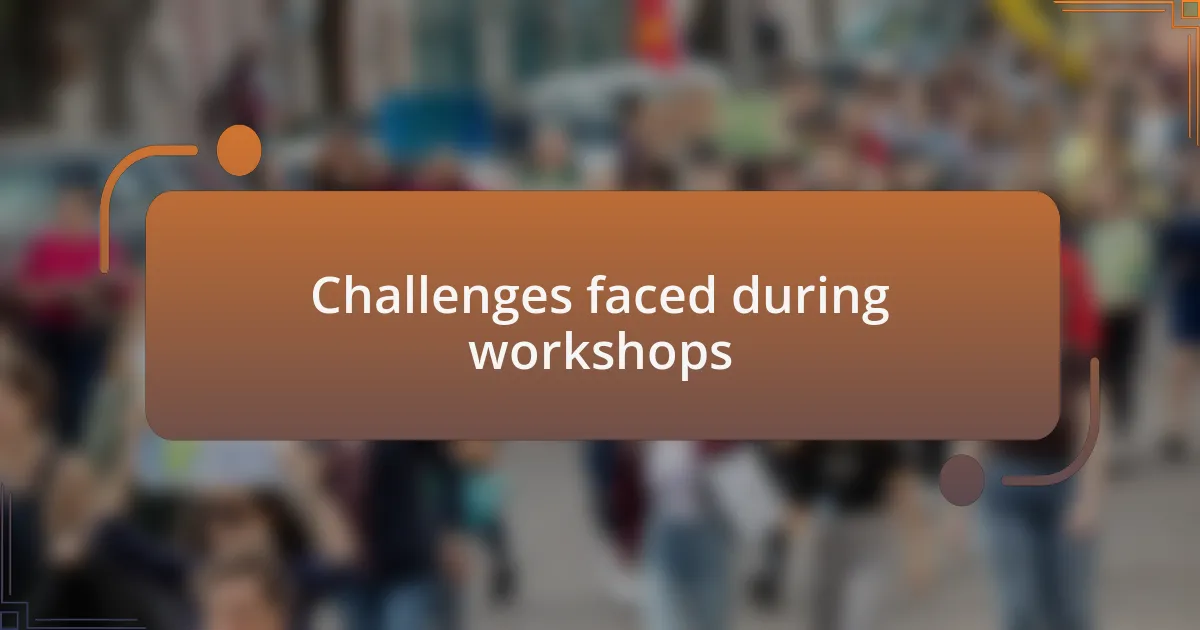
Challenges faced during workshops
Facilitating workshops certainly comes with its own set of challenges. One of the most striking difficulties I’ve encountered is managing differing levels of emotional investment among participants. In one instance, a few individuals were deeply passionate about the pro-life cause, while others approached the topic more casually. This dichotomy made it tough to create a balanced conversation. Have you ever felt like your heart was in it while others were simply along for the ride? I found it crucial to engage everyone at their own level, but it required a delicate touch to ensure no one felt marginalized.
Another challenge I faced involved addressing sensitive topics without triggering defensive responses. During a discussion on reproductive rights, the atmosphere shifted when opposing views clashed. I knew I had to navigate those waters carefully, using active listening to validate feelings. It’s interesting how sometimes just acknowledging where someone is coming from can defuse tension. I realized that creating a safe space for dialogue meant being ready to pause and redirect conversations, but that’s part of what makes a facilitator’s job so rewarding, don’t you think?
Timing can also be a hurdle during workshops. In one unforgettable session, I planned a variety of activities, eager to cover every aspect of our agenda. However, I quickly learned that the deep discussions taking place consumed more time than anticipated. That realization was both frustrating and enlightening. How do you balance the structured agenda with the organic flow of conversation? It turned out to be a reminder that we shouldn’t rush meaningful engagement. Adjusting my expectations about what could be accomplished allowed me to focus on quality over quantity, ultimately enhancing the overall experience for everyone involved.
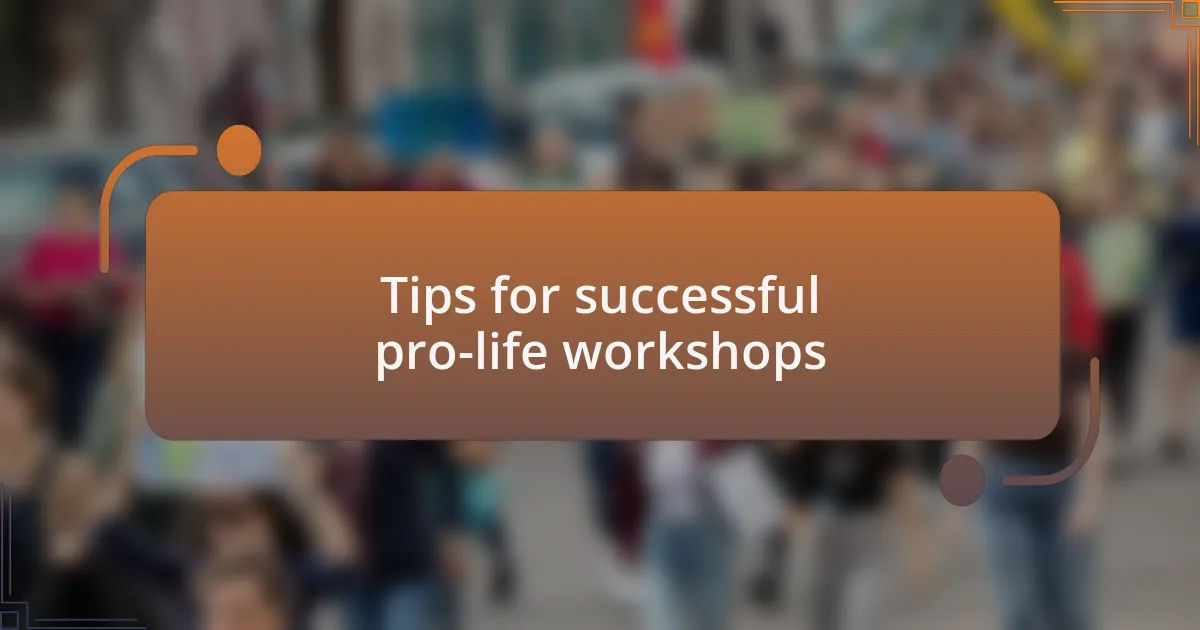
Tips for successful pro-life workshops
When planning a successful pro-life workshop, clarity in your objectives is key. I once led a session where I enthusiastically introduced multiple themes, but participants ended up feeling overwhelmed. It made me realize that having a focused agenda allows for more in-depth discussions. Have you ever felt lost when a topic felt too broad? Setting clear goals from the start can guide the conversation and help maintain engagement, reinforcing the importance of our purpose.
Engaging participants through varied activities can make a significant difference. I remember incorporating role-playing scenarios to help attendees step into the shoes of individuals facing difficult decisions. The shift in perspective was palpable. It’s amazing how interactive elements can spark deeper empathy and understanding among the group. Have you tried breaking traditional formats? Mixing things up can really transform the energy in the room.
Lastly, feedback at the end of a workshop is invaluable. I make it a point to allocate time for an open discussion about what worked and what didn’t. This practice not only shows that I value their input but also helps me improve future workshops. Have you ever left a session wishing you could have shared your thoughts? It’s in those moments of reflection that real growth happens, both for the facilitator and the participants.